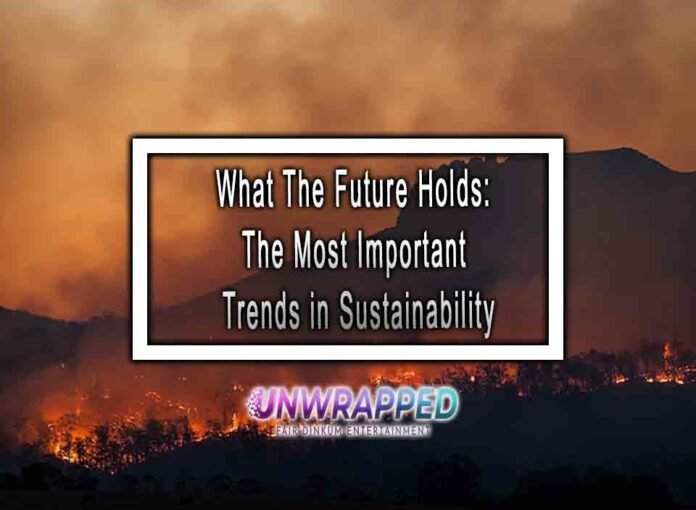Sustainability is one of the most important subjects discussed at the moment, especially given that its context is so broad. Using eco-friendly practices is an integral part of creating a better, safer future for the next generations and ensuring that the ecosystem is well-preserved and can continue to thrive. The devastating effects of climate change are already plainly visible through the increasing intensity and duration of heat waves, increased drought, higher incidence of extreme weather phenomena, loss of biodiversity, ocean warming, coral bleaching, as well as an increase in poverty and food insecurity.
Most scientists agree that human activities are primarily to blame for this situation. Human activities have caused climate change through an increase in greenhouse gases, which amplify the Earth’s natural greenhouse effect. The process is now believed to have started around the mid to late 19th century, causing an increase of 1.0 °C in global temperatures so far. If the process continues, it will lead to an ecological disaster, which is why many businesses and individuals have pledged to reduce their impact in order to safeguard the planet’s future. Here are some of the most meaningful trends in sustainability that both companies and conscious consumers are aware of.

Net zero emissions
The net-zero coalition plans to reduce greenhouse gas emissions as close to zero. This would be achieved by ensuring all the emissions released by human activities are counterbalanced through carbon removal. Doing so would ensure temperatures don’t rise above 1.5°C compared to pre-industrial levels. As emissions continue to increase, this goal is becoming more and more pressing.
Making the transition is very challenging, as in order to achieve this goal, systems must be fundamentally changed. From production to consumption, everything must be done differently. For example, replacing coal and oil with solar or wind power would markedly reduce emissions. Over seventy countries are involved in the net zero coalition, meaning nearly 80% of global emissions would be targeted. Rigorous action must be undertaken to ensure that emissions are at least halved by 2030.
Small actions for big impact
Although the goal is extensive, it is crucial to keep in mind that it’s the small actions that add up and make a difference. No activity or behaviour is too small to be introduced in an environmental protection strategy. For instance, managing adequate waste disposal remains crucial. Mil-tek offers solutions that increase the efficiency of waste handling, mainly through the use of compactors and balers. The methods are meant to save both money and space while reducing the carbon footprint of the businesses that use them.
There’s a baler and compactor for all business requirements, regardless of the volume that needs to be recycled or the material. Plastics, cardboard, aluminium or general waste can all be reused for different purposes. Making sure waste is managed effectively and efficiently isn’t just more hygienic; it also helps your business develop better by providing an energy-efficient solution that helps reduce your corporate environmental impact.
Making the switch to renewable energy remains relevant in 2023 as well. Due to political and military conflicts, energy prices have soared over the past year, with many consumers struggling to pay their bills in the face of significant energy price inflation. Renewables have, as a result, become a viable alternative, and despite ongoing challenges, it is clear that the shift will gradually become more accessible. Many businesses and industry sectors have already decided they can switch to green energy at least partially and have begun incorporating the solutions into their business plans.
Food changes
One of the most discussed aspects of sustainability is the food sector. Agriculture is known to have a considerable impact on the environment. Still, since it is a necessary industry and itself affected by climate change, the solutions need to make it both highly efficient and environmentally sustainable. This has proved to be a challenge, one which has led to the emergence of several different sustainable lifestyle trends.
Cutting down meat consumption is one of the most well-known due to the amount of emissions resulting from animal agriculture. Proponents argue that the food and water used to nourish the animals could be redistributed for human consumption. Others have taken it further, swearing off all animal products and adopting a fully plant-based or vegan lifestyle.
The widespread introduction of insect protein to the average diet has also been discussed, but it remains to be seen how well it will do in the future. Pet food has also started adopting the trend, and you can find options available on the market which are particularly suited for animals with food allergies.
Alternative protein, however, is bound to become more popular. Many shoppers are becoming interested in purchasing alternative protein. However, taste and texture are just as important, as many shoppers expect the legumes to be as close as possible to meat. There are many different ways in which plant protein can be made in a ready-to-cook form, including as sausages, mince or burgers.
Brand Transparency
Since introducing sustainability as a business policy, many companies have been accused of being disingenuous and resorting to greenwashing to meet their demands. Greenwashing refers to a corporation seeking to promote a positive impact on the environment that it supposedly supports. In reality, the effect is much smaller or altogether non-existent.
Buyers won’t stand for this any longer, and many demand increased brand transparency, so they can be confident their personal views align with those of the brand they purchase from. Going further, companies will likely be tested on their commitment to sustainability as governments around the world pass laws requiring frequent and comprehensive sustainability reporting. This legal obligation mustn’t be neglected, or it could potentially attract trouble for businesses that fail to comply.
The future looks bright for sustainability as more and more people become aware of their impact and what they need to do to mediate it. However, consistency is vital, as there must be follow-up on all sustainable actions. The time of doing nothing but the bare minimum has also passed, and individuals and businesses must actively look for ways to improve their habits and reduce their emissions. It’s the only way to protect the environment.










